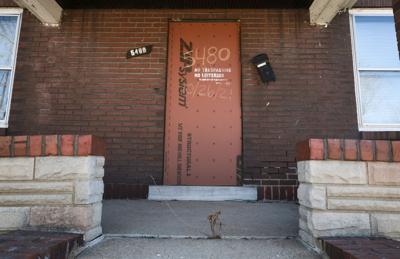
MSD says it is owed $34,000 in back payments for unpaid bills on this vacant home in the 5400 block of Claxton Avenue, shown here on Wednesday, Feb. 28, 2024, in the Mark Twain neighborhood of ėŻ╠ę╩ėŲĄ. The property, valued at just $9,500 by the ėŻ╠ę╩ėŲĄ assessor, is owned by the cityŌĆÖs Land Reutilization Authority (LRA), which was established to sell properties clear of past liens and unpaid bills. MSD, however, says a 2021 court ruling gives it the ability to try and force new owners to pay those outstanding bills.┬Ā
ST. LOUIS┬ĀŌĆö Unpaid sewer bills, like other uncollected taxes and bills, can be wiped clean from a propertyŌĆÖs title after it goes through a tax sale, a state appeals court ruled Tuesday.
The Eastern District Missouri Court of Appeals upheld a ruling by ėŻ╠ę╩ėŲĄ Judge Jason Sengheiser last year siding with the nonprofit Tabernacle Community Development Corp., which purchased a north ėŻ╠ę╩ėŲĄ property at a city tax sale. The appeals court rejected the Metropolitan ėŻ╠ę╩ėŲĄ Sewer DistrictŌĆÖs argument that its unpaid sewer bills, attached as liens to properties, superseded the state Municipal Land Reutilization Law that created the city tax sales process and land bank intended to clear titles to abandoned real estate.┬Ā
Years of unpaid sewer bills can add up to tens of thousands of dollars┬ĀŌĆö┬Āsometimes more than what abandoned properties in depressed neighborhoods are worth. Rehabbers and others said MSDŌĆÖs position threatened the already limited rehab activity on abandoned properties in some neighborhoods.┬ĀA lawyer for , which works to mitigate the impacts of vacant property in the city and filed an amicus brief with the court against MSDŌĆÖs position, cheered the ruling.
People are also reading…
ŌĆ£This ruling is a victory for everyone working to eliminate barriers to reinvestment in our city,ŌĆØ said Peter Hoffman, managing attorney of nonprofit Legal Service┬Āof Eastern MissouriŌĆÖs┬Ā┬Āprogram, which works on vacancy issues.
ėŻ╠ę╩ėŲĄ has the oldest municipal land bank in the country, created in 1971 to take ownership of thousands of abandoned properties left behind by the post-war exodus of a half million people to the suburbs. Abandoned properties first are offered for sale to the public after three years of unpaid taxes to clear the real estate title and prep the land for redevelopment. Unsold properties are transferred to the Land Reutilization Authority, or LRA.┬Ā
Historically, MSD, an independent government entity that serves ėŻ╠ę╩ėŲĄ and ėŻ╠ę╩ėŲĄ County, had not contested that tax sales extinguished its liens, along with mortgages, unpaid taxes and other debts on the property. A 2021 court case, also from the Eastern District Missouri Court of Appeals, however, suggested some additional weight for sewer district liens, and MSD began asserting it did not have to waive its liens after vacant properties went through tax foreclosure.
In court filings, MSD argued that because it was created via a provision in the Missouri Constitution, approved in 1954 by voters in the city and county, its lien ordinances to collect unpaid bills superseded the state land reutilization law. The appeals court on Tuesday said MSD ŌĆ£reads too much intoŌĆØ its authority from the state constitution.
ŌĆ£Simply put, while this constitutionally-created Plan may give MSD the authority to enact ordinances, it does not give those ordinances constitutional preeminence,ŌĆØ Judge┬ĀJames Dowd wrote.
MSD in a statement said it was disappointed with the court ruling and evaluating whether to appeal it to the Missouri Supreme Court.
ŌĆ£Our case was based on legal precedent and the clear authority granted to us by voters under the Missouri Constitution,ŌĆØ MSD spokesman Sean Stone wrote. ŌĆ£Our goal remains to protect the interests of our customers and ensure that all property owners contribute their fair share toward the essential services we provide.ŌĆØ
The ruling applies only to the state law written specifically for city tax sales and the LRA. However, the Legislature last year passed a law allowing the creation of a similar tax sale process and land bank in ėŻ╠ę╩ėŲĄ County. The language in that statute mirrors the language in the city law. If the county begins using a judicial tax foreclosure process for its new land bank, it also would clear sewer district liens, Hoffman, the Legal Services attorney, said.┬Ā
The Rev. Andre Alexander, TabernacleŌĆÖs president, said the ruling will allow his nonprofit to move ahead with plans for the property it bought near Fairground Park and clear the way for other nonprofits and rehabbers in north ėŻ╠ę╩ėŲĄ.┬Ā
ŌĆ£Hopefully it will bring more funding and partnerships and relationships to the area,ŌĆØ Alexander said.┬Ā
Post-Dispatch photographers capture tens of thousands of images every year. See some of their best work that was either taken in June 2025 in this video. Edited by Jenna Jones.















